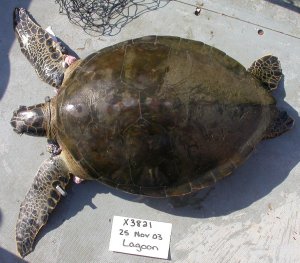Grant: 04-031R
Project Title: Identifying Environmental Co-factors Associated with Fibropapillomatosis in Green Turtles (Chelonia mydas)
Project Manager: Dr. John Fauth
Organization: University of Central Florida (Research and Educational Institute)
Grant Amount: $25,684.00
Completion Date: 2008-11-05
Summary: Fibropapillomatosis is an emergent infectious disease threatening Florida populations of green turtles. FP is most prevalent in marine environments degraded by agricultural, industrial, and urban development, but the environmental cofactors that increase incidence of FP remain unknown. We will use a novel biomolecular technology - a cellular-diagnostic system - to identify environmental stressors associated with increased prevalence of FP. We will compare different parameters among 3 populations of green turtles with differing incidence of FP to identify potential stressors associated with disease prevalence. Our goal is to identify environmentally mediated mechanisms of FP susceptibility and resistance in green turtles, thereby reducing the threat this herpesvirus poses to marine turtles.  Results: Fibropapillomatosis (FP), a tumor-causing disease caused by a herpes virus, is becoming increasingly common in marine turtles worldwide. In central Florida, FP is common in juvenile green turtles (Chelonia mydas) foraging in heavily-eutrophied Indian River Lagoon (IRL) and increasing in frequency on a near-shore sabellarid worm rock reef (SWRR), but very rare in a Trident submarine basin (TSB). In 2004-2005, blood samples were collected from juvenile C. mydas and turtle health was evaluated in these three sites. Cellular-diagnostic analysis indicated that compared to individuals at the other two sites, IRL turtles had elevated levels of enzymes involved in xenobiotic detoxification pathways, oxidative stress response, and protein metabolic condition. Elevated levels of cytochrome P450 classes 2 and 3 implicate electrophilic drugs and environmental pollutants and steroid-based compounds as likely contaminants. Elevated levels of cytochrome P450-2 class and heat shock protein 70 (which re-natures denatured proteins) were significantly correlated with reduced body condition. Elevated levels of heat shock protein 70 also were significantly correlated with increased probability of FP tumors. An in vitro experiment on mononuclear cells incubated with malathion, endosulfan, or solvent controls confirmed that cellular-diagnostic profiles of IRL were consistent with pesticide stress. These results show that cellular diagnostics can identify likely environmental cofactors associated with a viral disease, thereby providing evidence of a linkage between anthropogenic pollutants and declining health in a federally-endangered sea turtle. Project Website.
(Author: John Fauth, Joshua Reece, Craig Downs, & Llewellyn Ehrhart)
Results: Fibropapillomatosis (FP), a tumor-causing disease caused by a herpes virus, is becoming increasingly common in marine turtles worldwide. In central Florida, FP is common in juvenile green turtles (Chelonia mydas) foraging in heavily-eutrophied Indian River Lagoon (IRL) and increasing in frequency on a near-shore sabellarid worm rock reef (SWRR), but very rare in a Trident submarine basin (TSB). In 2004-2005, blood samples were collected from juvenile C. mydas and turtle health was evaluated in these three sites. Cellular-diagnostic analysis indicated that compared to individuals at the other two sites, IRL turtles had elevated levels of enzymes involved in xenobiotic detoxification pathways, oxidative stress response, and protein metabolic condition. Elevated levels of cytochrome P450 classes 2 and 3 implicate electrophilic drugs and environmental pollutants and steroid-based compounds as likely contaminants. Elevated levels of cytochrome P450-2 class and heat shock protein 70 (which re-natures denatured proteins) were significantly correlated with reduced body condition. Elevated levels of heat shock protein 70 also were significantly correlated with increased probability of FP tumors. An in vitro experiment on mononuclear cells incubated with malathion, endosulfan, or solvent controls confirmed that cellular-diagnostic profiles of IRL were consistent with pesticide stress. These results show that cellular diagnostics can identify likely environmental cofactors associated with a viral disease, thereby providing evidence of a linkage between anthropogenic pollutants and declining health in a federally-endangered sea turtle. Project Website.
(Author: John Fauth, Joshua Reece, Craig Downs, & Llewellyn Ehrhart)
Project Manuscript: Cellular diagnostics and health of juvenile green turtles (Chelonia mydas): Identifying environmental cofactors of fibropapillomatosis published in Diseases of Aquatic Organisms, Vol 70: 139-154, 2006. 